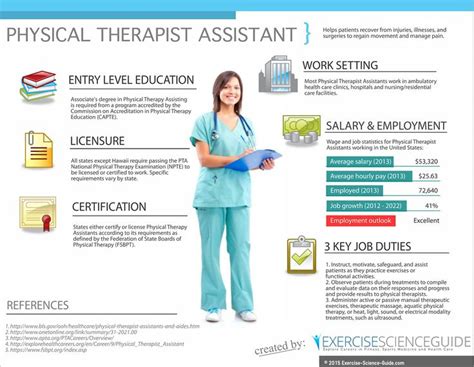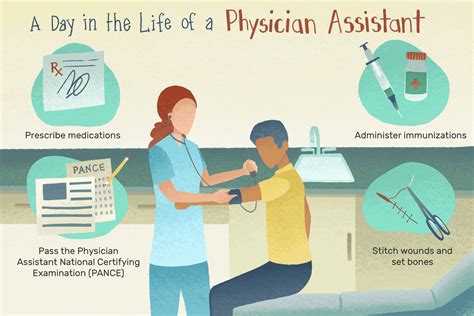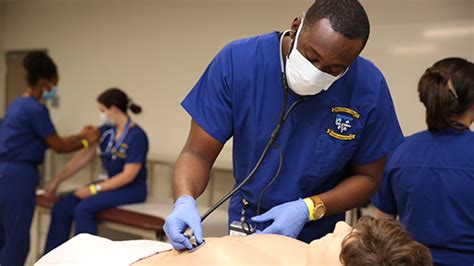Intro
Discover the multifaceted role of a Physician Assistant (PA) and explore their key job duties and responsibilities. From conducting exams and diagnosing patients to prescribing medications and developing treatment plans, learn about the essential tasks and skills required for success in this in-demand healthcare profession.
Physician assistants (PAs) play a vital role in the healthcare system, working closely with physicians and other medical professionals to provide high-quality patient care. As the demand for healthcare services continues to grow, the role of PAs has become increasingly important. In this article, we will delve into the job duties and responsibilities of physician assistants, exploring the skills and qualifications required for this rewarding career.
Physician assistants are advanced healthcare professionals who practice medicine under the supervision of licensed physicians. They are trained to provide a wide range of medical services, from routine check-ups and diagnoses to surgical procedures and emergency care. PAs work in various healthcare settings, including hospitals, clinics, private practices, and community health organizations.

Key Responsibilities of Physician Assistants
Physician assistants are responsible for a wide range of tasks, including:
Conducting Medical Exams and Diagnoses
PAs conduct physical exams, take medical histories, and order diagnostic tests to diagnose and treat patients. They use their knowledge of human anatomy, physiology, and pharmacology to identify potential health problems and develop treatment plans.
Developing and Implementing Treatment Plans
PAs work with physicians to develop and implement treatment plans, including prescribing medications, ordering lab tests, and referring patients to specialists. They also provide patient education and counseling to ensure that patients understand their treatment plans and can manage their conditions effectively.
Performing Surgical Procedures
PAs are trained to perform various surgical procedures, including biopsies, suturing, and casting. They may also assist surgeons during operations and provide post-operative care to patients.
Providing Preventive Care
PAs provide routine check-ups, health screenings, and vaccinations to prevent illnesses and promote healthy lifestyles. They also educate patients on healthy habits, disease prevention, and management of chronic conditions.
Collaborating with Healthcare Teams
PAs work closely with physicians, nurses, and other healthcare professionals to ensure that patients receive comprehensive care. They communicate effectively with team members, share patient information, and coordinate care to achieve optimal patient outcomes.

Skills and Qualifications Required for Physician Assistants
To become a physician assistant, one needs to possess a combination of academic knowledge, clinical skills, and personal qualities. Here are some of the key skills and qualifications required for PAs:
Academic Qualifications
- Earn a Master's degree in Physician Assistant Studies (MPAS) or a related field
- Complete a PA program accredited by the Accreditation Review Commission on Education for the Physician Assistant (ARC-PA)
- Pass the Physician Assistant National Certifying Examination (PANCE) to become certified
Clinical Skills
- Strong clinical skills, including medical history-taking, physical examination, and diagnosis
- Ability to interpret lab results, imaging studies, and other diagnostic tests
- Proficiency in medical procedures, such as suturing, casting, and biopsies
Personal Qualities
- Strong communication and interpersonal skills
- Ability to work effectively in teams and collaborate with healthcare professionals
- Compassion, empathy, and cultural competence in working with diverse patient populations
Continuing Education and Professional Development
- Complete continuing education requirements to maintain certification and licensure
- Stay up-to-date with the latest medical research, guidelines, and best practices
- Pursue professional development opportunities to enhance skills and knowledge

Work Environment and Salary for Physician Assistants
Physician assistants work in various healthcare settings, including hospitals, clinics, private practices, and community health organizations. They may work in primary care, specialty care, or surgical settings, and may have varying levels of autonomy and responsibility.
According to the Bureau of Labor Statistics (BLS), the median annual salary for physician assistants in the United States was $108,610 in May 2020. Salaries may vary depending on factors such as location, experience, and specialty.

Conclusion
Physician assistants play a vital role in the healthcare system, providing high-quality patient care and working closely with physicians and other medical professionals. To become a PA, one needs to possess a combination of academic knowledge, clinical skills, and personal qualities. With a strong foundation in medical science and clinical practice, PAs can pursue rewarding careers in various healthcare settings.
We hope this article has provided valuable insights into the job duties and responsibilities of physician assistants. If you're considering a career as a PA, we encourage you to explore further and learn more about this exciting and rewarding profession.
What is the role of a physician assistant?
+Physician assistants (PAs) are advanced healthcare professionals who practice medicine under the supervision of licensed physicians. They provide a wide range of medical services, from routine check-ups and diagnoses to surgical procedures and emergency care.
What are the key responsibilities of a physician assistant?
+Physician assistants are responsible for conducting medical exams and diagnoses, developing and implementing treatment plans, performing surgical procedures, providing preventive care, and collaborating with healthcare teams.
What skills and qualifications are required to become a physician assistant?
+To become a PA, one needs to possess a combination of academic knowledge, clinical skills, and personal qualities. This includes earning a Master's degree in Physician Assistant Studies, completing a PA program accredited by the ARC-PA, and passing the PANCE exam.
